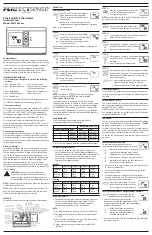
A Quick Test
CAUTION!
:
Do not switch system to cool if the outdoor temperature is below 50°F (10°C). This
can damage the air conditioning system and may cause personal injury.
Action:
Set the
Mode
switch to
Cool
. Press the
down
button until the temperature setting is 3°F
below the room temperature.
Result:
The A/C system and fan should turn on.
Action:
Set the
Mode
switch to
Off
.
Result:
The A/C should turn off (There may be a fan delay).
Action:
Set the
Fan
switch to
On
(continuous indoor fan operation).
Result:
The blower fan should turn on.
Action:
Set the
Fan
switch to
Auto
.
Result:
The blower fan should turn off.
If the above test was successful, you have a proper installation.
If not:
Double check that wires are securely connected and are connected to the proper terminals.
Consult the troubleshooting section.
Troubleshooting
Symptom
Remedy
The system isn’t turning on
Check the wiring, thermostat has 5 minute time delay to
protect the compressor
LCD is blank
Check wiring, verify 24 vac is present at R and C terminals
Thermostat is not properly
controlling the fan
Check wiring, place fan switch in Auto position
Thermostat is continuously turning
on and off
Increase the temperature differential
(see Setting a New Temperature Differential)
Temperature display is not accurate Plug the hole for wiring behind the thermostat with non-
flammable insulation to prevent airflow into the thermostat
Wiring Diagrams
24 VAC
T
H
E
R
M
O
S
T
A
T
120 VAC
HOT
Transformer
Fan
Control
Cooling Only
4-Wire, Single Transformer
R
C
Y
G
S2
S1
Cooling
System
ONE-YEAR LIMITED WARRANTY
The Seller warrants its products against defects in material or workmanship for a period of one (1) year
from the date of manufacture. The liability of the Seller is limited, at its option, to repair, replace or issue a
non-case credit for the purchase prices of the goods which are provided to be defective. The warranty and
remedies set forth herein do not apply to any goods or parts thereof which have been subjected to misuse
including any use or application in violation of the Seller’s instructions, neglect, tampering, improper storage,
incorrect installation or servicing not performed by the Seller. In order to permit the Seller to properly
administer the warranty, the Buyer shall: 1) Notify the Seller promptly of any claim, submitting date code
information or any other pertinent data as requested by the Seller. 2) Permit the Seller to inspect and test
the product claimed to be defective. Items claimed to be defective and are determined by Seller to be non-
defective are subject to a $30.00 per hour inspection fee. This warranty constitutes the Seller’s sole liability
hereunder and is in lieu of any other warranty expressed, implied or statutory. Unless otherwise stated
in writing, Seller makes no warranty that the goods depicted or described herein are fit for any particular
purpose.
LIAF021
Patent No. 424,953
7313 William Barry Blvd., North Syracuse, NY 13212
(
Toll Free
) 800-365-5525 (
Phone
) 315-233-5266 (
Fax
) 315-233-5276
www.icmcontrols.com
1. Remove cover from remote sensor housing.
2. Select an appropriate location for mounting the remote sensor.
3. Mount remote sensor unit using hardware provided.
4. Install two conductor shielded wires between remote sensor and thermostat. Shielded wire must
be used. Do not run remote sensor wire in conduit with other wires.
•
Wire 1
should run between the S1 terminal on the thermostat and the S1 terminal on the remote
sensor
•
Wire 2
should run between the S2 terminal on the thermostat and the S2 terminal on the remote
sensor
• Connect the shielding of the wire to the S2 terminal on the thermostat
5. Disable the main sensor on the thermostat by cutting it from the circuit board.
Remote Sensor Installation (Optional)
S1
S2
G
Y
C
Cut Thermistor from
circuit board
R




















